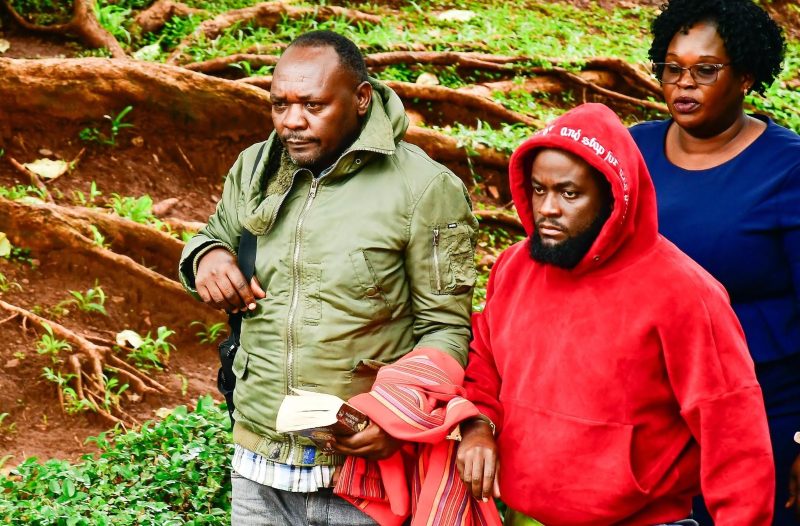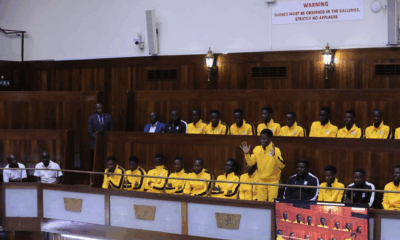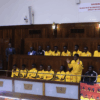News
Why Former CID Spokesperson Charles Twiine’s Bail is a Key Intelligence Indicator in Uganda’s Hate Speech Crackdown
The granting of Ugx 5 million cash bail to former Criminal Investigations Directorate (CID) Spokesperson, Detective Assistant Superintendent of Police (D/ASP) Charles Twiine Mansio, by the Buganda Road Chief Magistrates Court on Monday, is a notable development in Uganda’s ongoing, high-profile crackdown on hate speech and online incitement. While Twiine secured his temporary freedom, his co-accused, Noah Mitala alias Noah Mutwe, remains on remand, offering crucial insights into the judiciary’s differentiated approach to these sensitive cases.
Chief Magistrate Ronald Kayizzi’s decision highlights a critical aspect of Uganda’s justice system: the emphasis on “substantial sureties.” Twiine’s ability to present prominent individuals – a university lecturer, his wife (a secondary school teacher), a commissioner from the Equal Opportunities Commission, and his brother who is a restaurant director – met the court’s criteria, aligning with Chief Justice guidelines. Their non-cash bond of 50 million shillings further underscored their perceived reliability.
In stark contrast, Mitala’s sureties, comprising his father and other relatives, were deemed insufficient. This distinction points to the significant influence of social standing and perceived financial stability in securing bail, particularly in cases involving serious charges like incitement to kill. For intelligence, this suggests that the state may be more willing to grant leniency to individuals with established professional and social networks, while those perceived as having less societal influence face a stricter application of bail conditions.
Twiine faces charges of hate speech and incitement, specifically alleging that between January 2024 and May 2025, he used social media to incite Mitala to attack and cause the death of President Yoweri Kaguta Museveni and his son, General Muhoozi Kainerugaba, using pavers. The motivation is cited as their political opinion or offices held.
Furthermore, Twiine is accused of transmitting malicious information against key public figures:
- Speaker of Parliament Anita Annet Among: Allegedly called a “rotten human being” and chief sponsor of killings and violence in Bukedea District, intended to promote hostility.
- Deputy Speaker of Parliament Thomas Tayebwa: Accused of being a “money launderer, masquerader, and fraudster,” statements are likely to ridicule or degrade him.
- General Muhoozi Kainerugaba (Chief of Defence Forces): Allegedly referred to as a “fat pig and a crook.”
- General James Birungi: Allegedly called “a crook and a killer.”
- Bahima ethnic group: Accused of sharing claims that they are “killers,” statements alleged to promote tribal hostility.
Mitala, however, faces the more severe direct charge of incitement to kill. This distinction in charges and the court’s subsequent bail decision underscores the gravity with which direct threats to the President and CDF are viewed, compared to broad hate speech against other public figures or ethnic groups. The court explicitly cited the “serious nature of the charges” for Mitala’s continued remand.
Wider Crackdown on Online Dissent:
The case of Twiine and Mitala is not isolated. Both are appearing before the same court where other individuals, including Ibrahim Musana (Pressure 24 Seven) and a former Rubaga Deputy Resident City Commissioner, are facing similar charges of hate speech and spreading malicious information, particularly against Speaker Anita Among. This pattern suggests a concerted effort by the Ugandan authorities to curtail online dissent and information deemed “malicious” or “hate speech,” often leveraging the Computer Misuse Act and other relevant laws.
Both Twiine and Mitala deny the charges and maintain their innocence. Their case is scheduled for mention on July 14, 2025. The prosecution’s approach and the court’s rulings in this and related cases will be closely watched, as they continue to define the boundaries of freedom of expression and the application of hate speech laws in Uganda, particularly in the digital sphere. The differential treatment of the accused based on the perceived severity of their direct actions and the strength of their sureties also offers important insights into the operational dynamics of the Ugandan legal system in politically sensitive matters.
Comments





















